MercoPress. South Atlantic News Agency
Tag: Stock Markets
-
Monday, April 7th 2025 - 10:12 UTC
Early dawn stock markets show significant declines
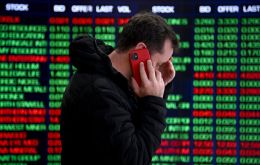
Australia's and most Asian stock markets experienced significant declines early Monday amid the global tariff war triggered by U.S. President Donald Trump. The Hang Seng Index in Hong Kong dropped 9.1% to 20,778.10, with a peak intraday fall of 10.2%, marking its worst day in over a year. Across the Asia-Pacific, 11 of 14 equity markets hit 52-week lows. In mainland China, the CSI 300 Index fell by 7.6%, while the Shanghai and Shenzhen Composite Indexes dropped by 7.4% and 9.8%, respectively. Japan’s Topix and Nikkei indexes also slumped, by 9.6% and 6.5%, respectively.
-
Tuesday, September 21st 2021 - 08:55 UTC
World markets sink on fears of a Chinese version of “Lehman Brothers 2008 bankruptcy”

Asian stocks sank on Monday amid fears of a potential collapse of the beleaguered Chinese real estate company Evergrande could lead to a wave of defaults in China's bloated housing market that could extend from the second-largest economy to the rest of the world. The company must pay this week interests on loans and bonds and experts fear it will not be able to honour creditors.
-
Tuesday, March 10th 2020 - 08:20 UTC
Argentine risk jumps on Monday to a record of 2,768 points, not seen since 2005
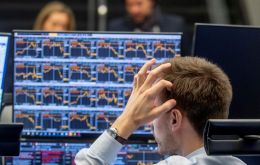
Argentine risk spreads on Monday shot to levels not seen since 2005 and sovereign bond prices fell 7.5%, as the coronavirus slammed global markets and the cash-strapped country prepared to restructure debt.
-
Friday, December 27th 2019 - 09:15 UTC
US stock markets at record highs on gains by tech giants
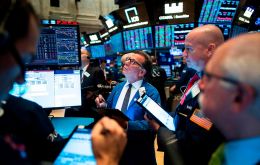
The tech-rich Nasdaq finished above 9,000 for the first time on Thursday, powering to its 10th straight record on gains by Amazon and other tech giants. The Nasdaq surged 69.51 points (0.78 percent) to finish the post-holiday session at 9,022.39.
-
Tuesday, August 6th 2019 - 09:15 UTC
World stock markets plunge as Beijing lets its currency to devalue and halts purchase of US farm produce

World stock markets plunged on Monday as Beijing parried US President Donald Trump's latest tariff announcements by moving to let China's Yuan currency devalue and halting purchases of US agricultural products.
-
Thursday, May 23rd 2019 - 09:57 UTC
Markets in the red on Wednesday over concerns with China-US trade dispute

US stocks fell back into the red on Wednesday, putting equities down for three of the last four sessions as investors reacted to reports of possible new US-China trade frictions.
-
Friday, April 5th 2019 - 09:37 UTC
Brazilian markets react positively on hopes of progress on pension reform

Most Latin American stock markets and currencies rose on Thursday, with assets in Brazil gaining on hopes of smooth progress on pension reform. Brazilian President Jair Bolsonaro met fellow politicians in a bid to build support to pass his government's proposal to reform the country's bloated pension system, seen by investors as crucial to trim Brazil's wide fiscal deficit.
-
Saturday, March 23rd 2019 - 09:06 UTC
Temer's arrest and military pensions' reform brings down Brazilian stock market and weakens currency
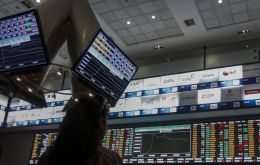
Brazilian stocks fell sharply on Friday as the arrest of the country’s former president, Michel Temer, sparked worries that government debate over key fiscal reforms may be delayed.
-
Tuesday, March 19th 2019 - 08:43 UTC
Brazilian stocks topped 100.000 points for the first time on the Bolsonaro syndrome

Brazilian stocks topped 100,000 points for the first time Monday, on hopes for progress in President Jair Bolsonaro's promised pro-market reforms. The Ibovespa, the country's main index in Sao Paulo, hit an intra-day record of 100,037.69 before closing at its highest level ever of 99,993.93, up 0.86% from the previous trading session.
-
Friday, September 7th 2018 - 09:18 UTC
IMF wants to wrap up talks to financially support Argentina “as rapidly as possible”
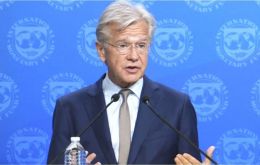
The International Monetary Fund said on Thursday it aimed to wrap up talks to “strengthen” a US$ 50 billion backup financing deal with Argentina “as rapidly as possible,” as the country's peso and stocks climbed for a second straight day.
